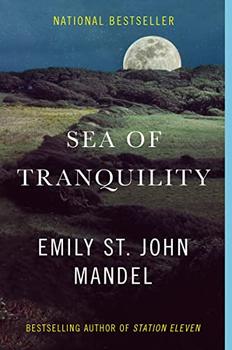Summary | Excerpt | Reviews | Beyond the book | Read-Alikes | Genres & Themes | Author Bio

A Novel
by Anton HurIn a research lab in the near future, Dr. Mali Beeko is chronicling in her notebook the disappearance of Yonghun, whom she refers to as Patient One. As a young man, he died of cancer, and his body was restored through a process called nanotherapy, in which his cells were replaced with android cells called nanites. The newly reconstructed Yonghun is essentially immortal—so now that he has vanished quite literally into thin air, Mali is faced with questions of what this means for her research. In her search for Yonghun, she turns to Panit, an artificial being whom Yonghun, a PhD in Victorian Poetry, trained to analyze and appreciate literature.
This is only the start of Anton Hur's expansive novel, which spans centuries as it explores the unwanted ramifications of scientific progress into the study of artificial intelligence. Hur, the Korean-to-English translator of many noted works, such as Bora Chung's Cursed Bunny, Baek Se-hee's I Want to Die but I Want to Eat Tteokbokki, Sang Young Park's Love in the Big City, and Kyung-sook Shin's The Court Dancer, is understandably concerned with language, all its possibilities and limitations, and how deeply entwined language and humanity are.
This theme is crystallized in a passage in which Panit, inhabiting a human body after having been given the choice to undergo an experimental procedure, reflects on a passage from Macbeth: "Will all great Neptune's ocean wash this blood/ Clean from my hand? No, this my hand will rather/ The multitudinous seas incarnadine." Panit, while having already possessed tools to experience literature from an analytical perspective, now is confronted by these words through a human consciousness, and is struck as if hearing them for the very first time:
"I suddenly realized that I understood the words like I'd never understood them before. The multitudinous seas incarnadine. Words that were not simply bits of cross-referential information but each a thing of living, breathing, tactile emotion. [...] Had I ever truly understood any word before, ever? How could I have claimed to have made a study of poetry or that this study had made me human when I had never understood what it means to feel words?"
This is the question at the heart of Toward Eternity: through AI, how much humanity is preserved and how much is lost? Only the novel's first narrator, Mali, is fully human. Each successive narrator is writing in the same notebook, passed along through generations, but they are all androids, whose memories of humanity are diluted more and more as the centuries go by. Even so, each of them yearns in some way for what has been lost: they cling to ideas and talismans that signal to individuality—poetry, seashells, memories once made in the bodies they currently inhabit.
As the story stretches further and further into the future and the world descends into a chaos of clones and nuclear war, certain passages begin to feel less accessible than the more gentle beginning, but perhaps this is entirely the point in a novel that chronicles the dissolution of humanity. Toward Eternity is an ambitious project, and while some segments are more successful than others, ultimately it comes together as a thoughtful exploration of a possible version of our future, reflecting on what is lost as much as what is gained through scientific progress.
![]() This review was originally published in The BookBrowse Review in July 2024, and has been updated for the
August 2025 edition.
Click here to go to this issue.
This review was originally published in The BookBrowse Review in July 2024, and has been updated for the
August 2025 edition.
Click here to go to this issue.

If you liked Toward Eternity, try these:

by Jayson Greene
Published 2025
From the author of Once More We Saw Stars comes a gripping novel about four intertwined lives that collide in the wake of a mysterious tragedy. Set in a near-future world where the boundaries between human and AI blur, the story challenges our understanding of consciousness and humanity.

by Emily St. John Mandel
Published 2023
The award-winning, best-selling author of Station Eleven and The Glass Hotel returns with a novel of art, time, love, and plague that takes the reader from Vancouver Island in 1912 to a dark colony on the moon five hundred years later, unfurling a story of humanity across centuries and space.
Your guide toexceptional books
BookBrowse seeks out and recommends the best in contemporary fiction and nonfiction—books that not only engage and entertain but also deepen our understanding of ourselves and the world around us.